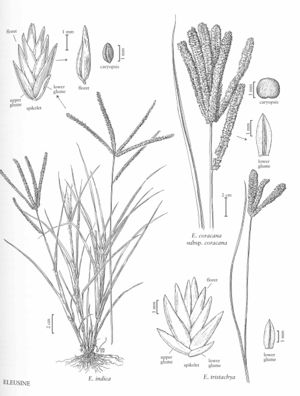Difference between revisions of "Eleusine indica"
FNA>Volume Importer |
imported>Volume Importer |
||
| (5 intermediate revisions by 2 users not shown) | |||
| Line 4: | Line 4: | ||
|publications= | |publications= | ||
|common_names=Goosegrass;Eleusine des indes;Eleusine d'inde | |common_names=Goosegrass;Eleusine des indes;Eleusine d'inde | ||
| + | |special_status={{Treatment/ID/Special_status | ||
| + | |code=I | ||
| + | |label=Introduced | ||
| + | }} | ||
|basionyms= | |basionyms= | ||
|synonyms= | |synonyms= | ||
| Line 16: | Line 20: | ||
-->{{Treatment/Body | -->{{Treatment/Body | ||
| − | |distribution=Conn.;N.J.;N.Y.;W.Va.;Wis.;Del.;D.C;Mass.;Maine;N.H.;Ont.;Que.;Pacific Islands (Hawaii);Fla.;Puerto Rico;N.Mex.;Tex.;La.;N.Dak.;Tenn.;N.C.;S.C.;Pa.;Kans.;Nebr.;Okla.;S.Dak.;Nev.;Va.;Colo.;Virgin Islands;Calif.;Ala.;Ark.;Vt.;Ill.;Ga.;Ind.;Iowa;Ariz.;Md.;Ohio;Utah;Mo.;Minn.;Mich.;R.I.;Miss.;Ky.;Oreg. | + | |distribution=Conn.;N.J.;N.Y.;W.Va.;Wis.;Del.;D.C.;Mass.;Maine;N.H.;Ont.;Que.;Pacific Islands (Hawaii);Fla.;Puerto Rico;N.Mex.;Tex.;La.;N.Dak.;Tenn.;N.C.;S.C.;Pa.;Kans.;Nebr.;Okla.;S.Dak.;Nev.;Va.;Colo.;Virgin Islands;Calif.;Ala.;Ark.;Vt.;Ill.;Ga.;Ind.;Iowa;Ariz.;Md.;Ohio;Utah;Mo.;Minn.;Mich.;R.I.;Miss.;Ky.;Oreg. |
|discussion=<p><i>Eleusine indica</i> is a common weed in the warmer regions of the world. In the Flora region, it usually grows in disturbed areas and lawns, and has been found in most states of the contiguous United States.</p> | |discussion=<p><i>Eleusine indica</i> is a common weed in the warmer regions of the world. In the Flora region, it usually grows in disturbed areas and lawns, and has been found in most states of the contiguous United States.</p> | ||
|tables= | |tables= | ||
| Line 26: | Line 30: | ||
-->{{#Taxon: | -->{{#Taxon: | ||
name=Eleusine indica | name=Eleusine indica | ||
| − | |||
|authority=(L.) Gaertn. | |authority=(L.) Gaertn. | ||
|rank=species | |rank=species | ||
| Line 33: | Line 36: | ||
|basionyms= | |basionyms= | ||
|family=Poaceae | |family=Poaceae | ||
| − | |distribution=Conn.;N.J.;N.Y.;W.Va.;Wis.;Del.;D.C;Mass.;Maine;N.H.;Ont.;Que.;Pacific Islands (Hawaii);Fla.;Puerto Rico;N.Mex.;Tex.;La.;N.Dak.;Tenn.;N.C.;S.C.;Pa.;Kans.;Nebr.;Okla.;S.Dak.;Nev.;Va.;Colo.;Virgin Islands;Calif.;Ala.;Ark.;Vt.;Ill.;Ga.;Ind.;Iowa;Ariz.;Md.;Ohio;Utah;Mo.;Minn.;Mich.;R.I.;Miss.;Ky.;Oreg. | + | |illustrator=Linda A. Vorobik;Karen Klitz |
| + | |illustration copyright=Utah State University | ||
| + | |distribution=Conn.;N.J.;N.Y.;W.Va.;Wis.;Del.;D.C.;Mass.;Maine;N.H.;Ont.;Que.;Pacific Islands (Hawaii);Fla.;Puerto Rico;N.Mex.;Tex.;La.;N.Dak.;Tenn.;N.C.;S.C.;Pa.;Kans.;Nebr.;Okla.;S.Dak.;Nev.;Va.;Colo.;Virgin Islands;Calif.;Ala.;Ark.;Vt.;Ill.;Ga.;Ind.;Iowa;Ariz.;Md.;Ohio;Utah;Mo.;Minn.;Mich.;R.I.;Miss.;Ky.;Oreg. | ||
|reference=None | |reference=None | ||
|publication title= | |publication title= | ||
|publication year= | |publication year= | ||
| − | |special status= | + | |special status=Introduced |
| − | |source xml=https:// | + | |source xml=https://bitbucket.org/aafc-mbb/fna-data-curation/src/200273ad09963decb8fc72550212de541d86569d/coarse_grained_fna_xml/V25/V25_175.xml |
|subfamily=Poaceae subfam. Chloridoideae | |subfamily=Poaceae subfam. Chloridoideae | ||
|tribe=Poaceae tribe Cynodonteae | |tribe=Poaceae tribe Cynodonteae | ||
Latest revision as of 17:58, 11 May 2021
Plants annual. Culms 30-90 cm, erect or ascending, some-what compressed; lower internodes 1.5-2 mm thick. Sheaths conspicuously keeled, margins often with long, papillose-based hairs, particularly near the throat; ligules 0.2-1 mm, truncate, erose; blades 15-40 cm long, 3-7 mm wide, with prominent, white midveins, margins and/or adaxial surfaces often with basal papillose-based hairs. Panicles with 4-10(17) branches, often with 1 branch attached as much as 3 cm below the terminal cluster; branches (3.5)7-16 cm long, 3-5.5 mm wide, linear. Spikelets 4-7 mm long, 2-3 mm wide, with 5-7 florets, obliquely attached to the branch axes. Lower glumes 1.1-2.3 mm, 1-veined; upper glumes 2-2.9 mm; lemmas 2.4-4 mm; paleas with narrowly winged keels. Seeds ovoid, rugulose and obliquely striate, usually not exposed at maturity. 2n = 18.
Distribution
Conn., N.J., N.Y., W.Va., Wis., Del., D.C., Mass., Maine, N.H., Ont., Que., Pacific Islands (Hawaii), Fla., Puerto Rico, N.Mex., Tex., La., N.Dak., Tenn., N.C., S.C., Pa., Kans., Nebr., Okla., S.Dak., Nev., Va., Colo., Virgin Islands, Calif., Ala., Ark., Vt., Ill., Ga., Ind., Iowa, Ariz., Md., Ohio, Utah, Mo., Minn., Mich., R.I., Miss., Ky., Oreg.
Discussion
Eleusine indica is a common weed in the warmer regions of the world. In the Flora region, it usually grows in disturbed areas and lawns, and has been found in most states of the contiguous United States.
Selected References
None.
